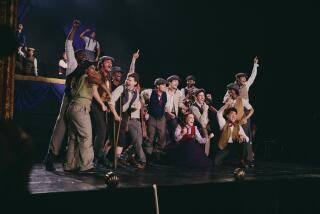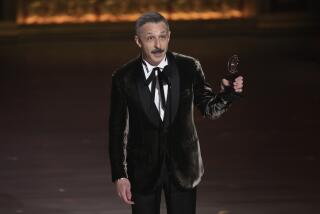Tony clips put actors stage center
Nary a pledge week goes by when one or another public television station isn’t reprising the “Broadway’s Lost Treasures” series, because, after all, whose pockets are easier to pick during a fundraising drive than a musical-theater lover’s? But one thing you won’t have seen, presumably because it hasn’t been available, is the series’ companion volume of straight theater -- “The Best of the Tony Awards: The Plays” -- which was recently released by Acorn Media ($19.99).
As with the “Lost Treasures” collection, this one-disc program is a fond remembrance of Tony Awards past, its 19 clips culled from the archives of broadcasts between 1969 and 2003. Needless to say, the DVD features rare gems for the theater historian to savor, and we’ll get to those in a moment, but let’s first lament the latter-day executives at CBS, who, to be honest, wouldn’t be caught dead giving five or more continuous minutes of airtime to a play on a Tony telecast.
We’re impressed by the lean, youthful James Earl Jones of “The Great White Hope”; his finely etched portrait (thinly disguised) of the first African American heavyweight champion, Jack Johnson; and the travails that befell a black man who dared to have a white girlfriend in 1908 (a young Jane Alexander). But as the excerpt from the 1969 Tonys enters its sixth and seventh minute, your gloominess over Jack’s predicament transfers to thoughts of the broadcast itself and of a Broadway theater community that is now forced to celebrate an entire season -- plays, musicals, spectacles and vanity effluvia -- during just two hours on a Sunday night in June.
But , oh, what a pleasure some of these extended clips can be. There’s Art Carney and Anna Manahan as a pair of lovebirds who must keep talking loudly so Manahan’s mother upstairs doesn’t suspect there’s any hanky-panky going on in “Lovers,” a 1968 Brian Friel play. And if you’ve never seen the incomparable Maggie Smith on stage, her turn as a dotty tour guide in Peter Shaffer’s “Lettice and Lovage” (from the 1990 telecast) is both hilarious and heartbreaking.
Smith’s performance is a reminder that, then as now, the acting on Broadway frequently outpaces the material. Or maybe it’s just that the plays seem more time-bound than the performances. Annette Bening’s charm, that combination of warmth and loopiness she would later mine in her film career, is abundantly evident in an excerpt from 1987’s “Coastal Disturbances,” even if the young-lovers-on-a-beach situation doesn’t quite compel. Joan Allen and Peter Friedman (“The Heidi Chronicles”) and Madeline Kahn and Robert Klein (“The Sisters Rosensweig”) remind us, if only fleetingly, how much Wendy Wasserstein plays once mattered. And seeing Joe Mantegna and Ron Silver breeze through the Mametian patter song of “Speed-the-Plow” reminds us how much Hollywood can bring to Broadway, particularly when playwrights take Hollywood as their inspiration.
But the cream of the clips, the utterly unmissable work here, can be found in excerpts from several August Wilson plays. Charles S. Dutton dances gracefully around the selling of a family heirloom in 1990’s “The Piano Lesson.” Viola Davis angrily confesses to aborting a baby in 2001’s “King Hedley II,” tearing down the house in the process. Most powerful of all is Jones, almost 20 years older than first we saw him -- grayer, heavier and oozing gravitas in Wilson’s great 1987 play “Fences.” One tentative question from his son (Courtney B. Vance) -- “How come you ain’t never liked me?” -- unleashes a monologue so furious and yet so utterly true that it leaves the Tony audience awestruck.
Acorn Media has plucked yet one more theatrical curio from the archives, an HBO presentation of “Camelot” ($29.99), which was itself a film version of the 1981 stage revival of the 1960 Lerner and Loewe musical. Richard Harris reprised the role of King Arthur, which he’d played with mixed success in the 1967 film version, and musical theater aficionados will enjoy comparing the mascara-less and mascaraed versions.
More to Read
The biggest entertainment stories
Get our big stories about Hollywood, film, television, music, arts, culture and more right in your inbox as soon as they publish.
You may occasionally receive promotional content from the Los Angeles Times.










